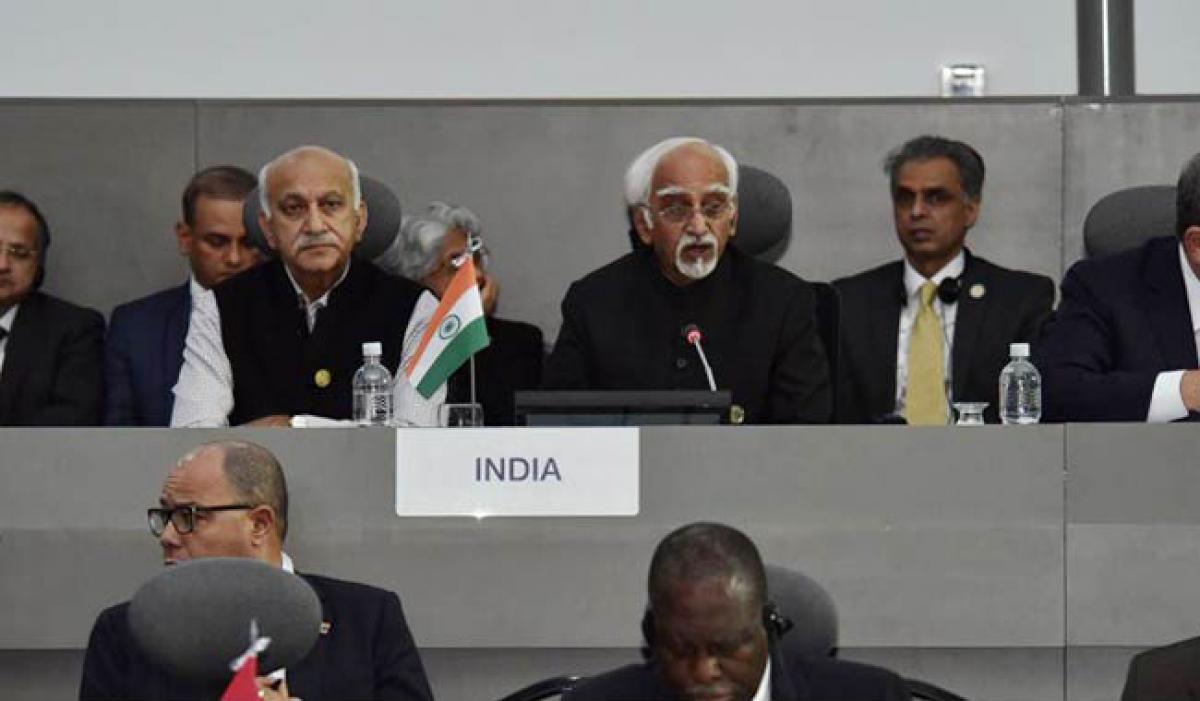Live
- SCR to run special trains
- No compromise on quality of laddu, says Collector
- Hyderabad: City sways to Uyyalo songs, spins, twirls to Garba beats
- BJP worker shot at outside Faridabad polling booth
- RCF Kapurthala made Vande Metro @145 kmph
- Cyberabad police discuss strategies with IT industry to alleviate traffic
- PM may lay stone for railway zone in Vizag
- Blast at illegal firecracker making unit in UP, 2 dead
- Cong govt fraud on farm loan waiver exposed: BJP
- Agri Market Committee must work on farmers’ welfare: Komatireddy
Just In

Making a strong pitch against terrorism, on Sunday, India sought concrete action and setting up of a mechanism by the 120 member countries of the Non-Aligned Movement (NAM) to ensure effective cooperation to combat the menace.
Making a strong pitch against terrorism, on Sunday, India sought "concrete action" and setting up of a mechanism by the 120 member countries of the Non-Aligned Movement (NAM) to ensure effective cooperation to combat the menace.
Vice President Hamid Ansari, who is leading the Indian delegation at the 17th NAM Summit, said terrorism is one of the "most egregious sources of human right violations today" and its use as an instrument of state policy is to be unequivocally condemned.
The time has come "for our movement to recognise the need for concrete action in the fight against terrorism", Ansari said while addressing the plenary meeting of the bloc in the absence of Prime Minister Narendra Modi.
"We need to establish a mechanism within our movement that will ensure effective cooperation in combating terrorism, that is the main threat to security, sovereignty and development," he said.
Ansari's remarks came against the backdrop of India raising its concerns at various international fora over Pakistan's support to cross-border terrorism.
Modi had made clear references to Pakistan's support to terrorism without naming it at the G20 Summit in Hangzhou, at a BRICS meeting in Hangzhou and at the ASEAN and East Asia summits in Lao PDR.
Describing terrorism as the "biggest threat" to international peace and to the sovereignty of states, Ansari asserted that no cause justifies the indiscriminate killing of innocent civilians as a means to achieve a political goal or change of policies.
He stated that terrorism has become a major impediment to development. "It is therefore imperative for the Non-Aligned Movement to galvanise the international community to strengthen the international legal framework to address this menace, including by adopting the draft Comprehensive UN Convention on Terrorism, to ensure the closest cooperation amongst the international community to counter the scourge of terror," he said.
"We must also ensure that all existing structures that are the building blocks of UN's Global Counter Terrorism Strategy function in a non-partisan and professional manner," Ansari said.
Earlier, during NAM's Foreign Ministers' meeting, Minister of State for External Affairs M J Akbar had also called on NAM to set up a "working group on terrorism" to safeguard world peace, stability and prosperity.
"Governments which think they can pay lip service to sanity at a NAM summit, and continue to arm, shelter and exploit terrorists in a war by other means, when they return home will learn that you cannot sip on poison and hope to live," Akbar had said in an apparent reference to Pakistan.
Earlier, sources had said that Pakistani representative Tasneem Aslam alone spoke against the working group proposal and opposed the consensus that had built around the proposal which had the support of a large number of NAM delegations.
"Despite being isolated, Pakistan continued with its objections to stall the proposal emphasising that there could not be a consensus on terrorism," the sources said.
The draft declaration also noted that the phenomenon of foreign terrorist fighters and the spread of violent extremism can be conducive to terrorism, making it necessary for states to prevent and combat terrorism in all its forms and manifestations, including its financing and the illicit transfer of weapons, in a decisive and coordinated manner, with strict adherence to the provisions of the Charter of the United Nations, as well as other obligations under international law.
In this regard, the NAM countries also considered that the adoption of a future Comprehensive Convention for Combating International Terrorism could complement the set of existing international legal instruments, including the implementation of the United Nations Global Counter-Terrorism Strategy.
In addition, they reaffirmed that terrorism and violent extremism as and when conducive to terrorism cannot and should not be associated with any religion, nationality, civilisation or ethnic group, and that these attributions should not be used to justify terrorism or Contreras measures that include, inter alia, profiling of terror suspects and intrusion on individual privacy.
Akbar, in the briefing, pointed out that even President Maduro in his opening statement acknowledged the need for combating terror. He said another area of interest to be reflected in the draft declaration was the reform in the UN.
"This reform is (not only) reform of the various structures of the UN but also (of) its working methods and all. Again there is some language which reflects that the UN should reform itself as well as the Security Council should reflect the realities of today because many of us think it is not reflective of the global realities at present today," Akbaruddin said.

© 2024 Hyderabad Media House Limited/The Hans India. All rights reserved. Powered by hocalwire.com







